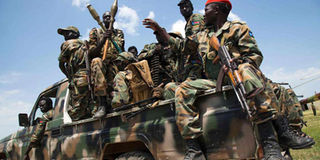Sudan captures 6 Chadians suspected to be Boko Haram

Soldiers of the Sudan People Liberation Army (SPLA) sit in a pick-up truck at the military base in Malakal, northern South Sudan, on October 16, 2016. PHOTO | ALBERT GONZALEZ FARRAN | AFP
What you need to know:
- It is the first time that Sudanese authorities have reported the arrest of suspected Boko Haram jihadists inside the country.
- Chad, a vast and mostly desert nation with more than 200 ethnic groups, shares a long border with Sudan.
- Boko Haram started out as an Islamic anti-corruption group but mutated into an affiliate of the Islamic State jihadist group.
Khartoum,
Sudan's army said Thursday it had caught six Chadians accused of belonging to Boko Haram, in the country's first such arrests of suspected members of the jihadist group which originated in Nigeria.
"Sudanese army intelligence captured six members of the Boko Haram terrorist group inside Sudanese territory," the army said in a statement.
"They are Chadian nationals and since there is a security agreement between the two countries, Sudanese authorities handed them to Chadian authorities."
It did not specify when the alleged jihadists were arrested or handed over.
FIRST REPORT
It is the first time that Sudanese authorities have reported the arrest of suspected Boko Haram jihadists inside the country.
Chad, a vast and mostly desert nation with more than 200 ethnic groups, shares a long border with Sudan.
Under President Idriss Deby, a former head of the armed forces, Chad has taken a leading role in the fight against jihadism in the Sahel region.
It is part of a West African coalition fighting the Boko Haram insurgency, and a member of the French-backed G5 Sahel anti-terror alliance, which also includes Burkina Faso, Mali, Mauritania, and Niger.
Boko Haram started out as an Islamic anti-corruption group but mutated into an affiliate of the Islamic State jihadist group.
It aims to create a hardline Islamic state in northeastern Nigeria. Its campaign has cost at least 27,000 lives since 2009, displaced 1.8 million people and spilt over into neighbouring countries.





